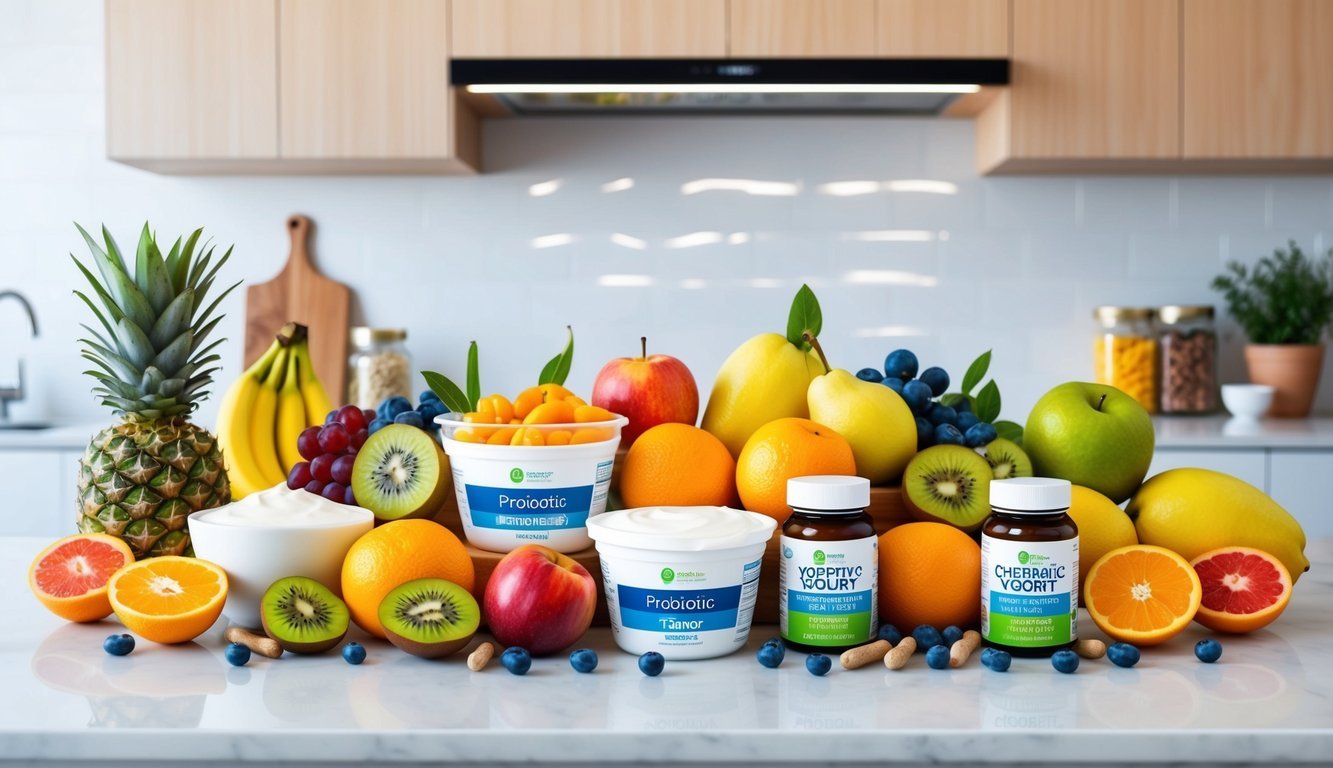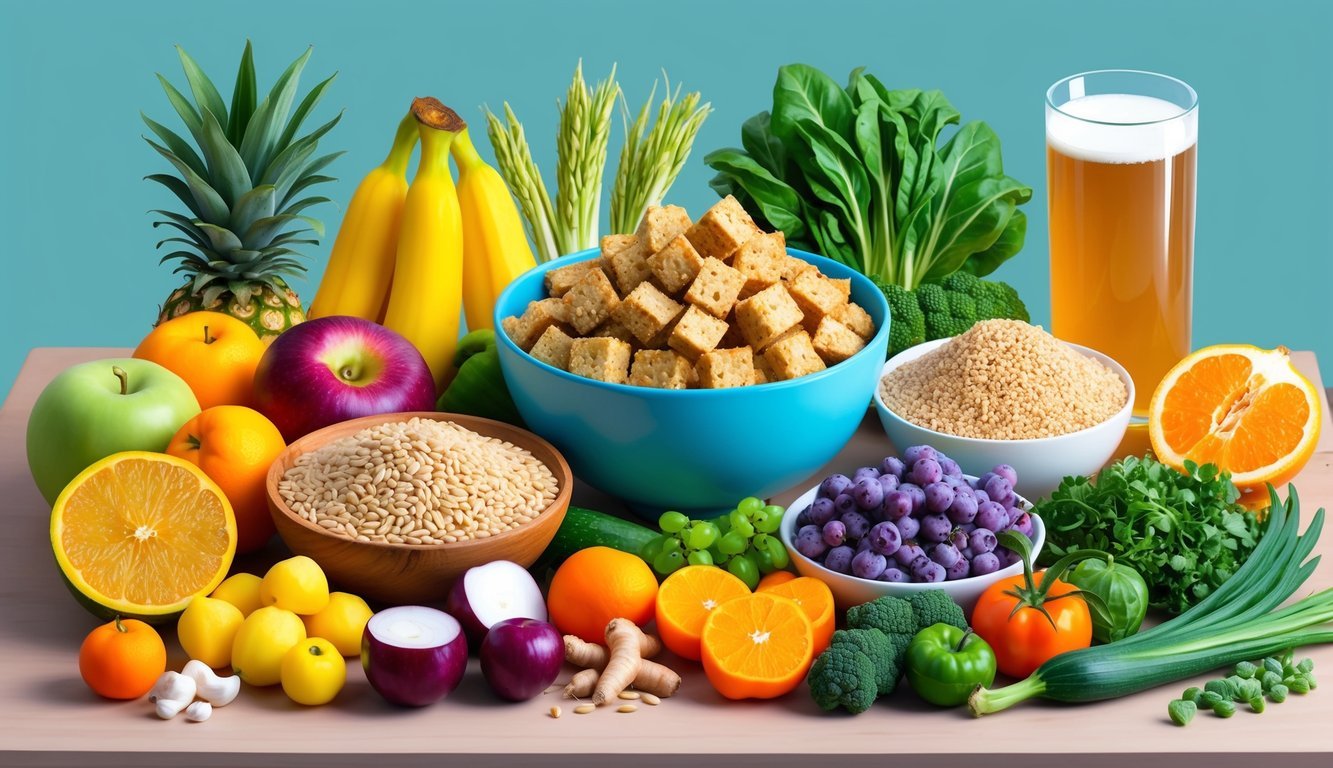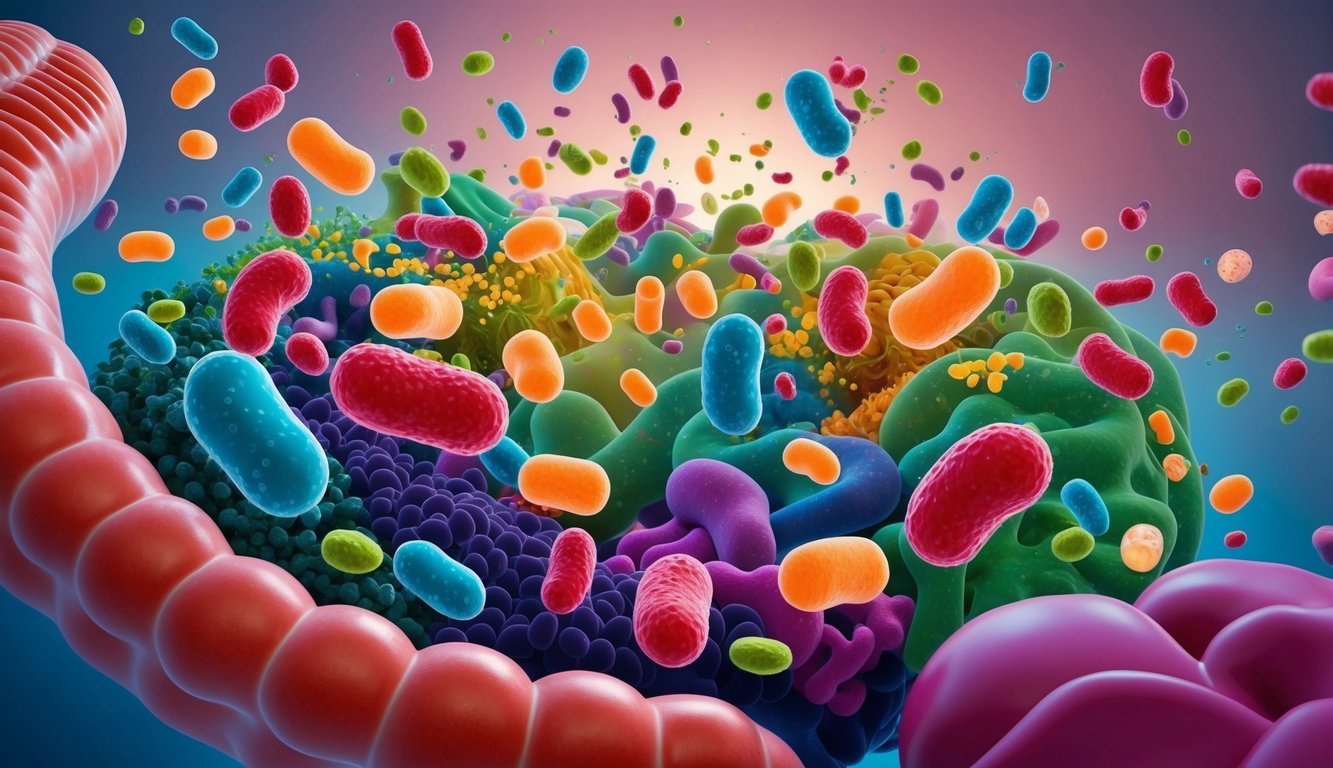Maintaining a healthy gut is essential for overall wellness, but many of us struggle with digestive issues and imbalance in gut flora.
My journey to improve gut health made me realize how connected our digestive system is to our overall well-being. Understanding how to restore gut flora can lead to better digestion, enhanced immunity, and increased energy levels.

I’ve explored various strategies that are backed by research and personal experience, and I’ve found eight proven methods that can effectively support gut health.
Taking steps to nourish and balance the gut microbiome can make a big difference in how we feel, both physically and mentally.
Whether you’re dealing with specific digestive concerns or simply want to enhance your overall health, these strategies will help guide us on the right path.
Fermented Sauerkraut
I’ve found that fermented sauerkraut is a fantastic way to boost gut health.
This tangy dish is made from fermented cabbage, which means it’s packed with probiotics.
These friendly bacteria are essential for a healthy digestive system.
When I incorporate sauerkraut into my meals, I notice improvements in my digestion.
It can help improve nutrient absorption, making it easier for my body to get the vitamins and minerals it needs.
I appreciate that sauerkraut is versatile.
I can add it to salads, sandwiches, or enjoy it as a side dish.
Eating sauerkraut with meals can enhance its benefits, allowing those probiotics to survive the stomach’s acidity and reach my intestines.
Beyond digestion, sauerkraut offers vitamins like C and K. These nutrients support my immune system and overall health.
Keeping a jar in my fridge means I always have an easy source of beneficial bacteria ready to go.
Kefir Drinks
Kefir drinks are a fantastic addition to my diet when I want to boost my gut health.
They’re made by fermenting milk or water with kefir grains, which are packed with probiotics.
These beneficial bacteria can help improve digestion and support a healthy gut microbiome.
I’ve found that incorporating kefir into my routine can aid in lactose digestion for those sensitive to dairy.
It’s a great source of nutrients, providing protein, vitamins, and minerals, which makes it a wholesome choice.
Additionally, drinking kefir may help manage blood sugar levels.
Some studies indicate that it can be beneficial for people with Type 2 diabetes by helping to stabilize glucose levels.
I enjoy a glass of kefir after meals or as a refreshing snack.
It has a slightly tangy taste that pairs well with fruits or granola.
Plus, it’s easy to make at home, allowing me to customize flavors to my liking.
With its rich probiotic content and various health benefits, kefir drinks are a simple yet effective way to enhance my digestive health.
Kombucha Tea
Kombucha tea is a fermented beverage that’s gaining popularity for gut health.
I’ve found that drinking it can be a refreshing way to introduce probiotics into my diet.
Kombucha is made by fermenting sweetened tea with a culture of bacteria and yeast.
This process creates a drink that’s rich in beneficial probiotics.
These probiotics can help balance gut flora, which is crucial for good digestion.
I typically enjoy kombucha before meals, as it seems to prepare my stomach for food.
Alternatively, drinking it after meals feels soothing and can assist with digestion.
The antioxidants in kombucha may help combat oxidative stress in the intestines.
Plus, I’ve come across studies suggesting that kombucha can promote a balanced gut microbiota, leading to improved overall health.
While not a magic cure, incorporating kombucha into my routine has definitely contributed positively to my digestive health.
It’s a tasty way to support my gut flora naturally.
Yogurt with Live Cultures

I’ve found that yogurt with live cultures can be a simple yet effective way to support gut health.
This tasty dairy option is packed with probiotics, which are beneficial bacteria that help maintain a balanced digestive system.
Yogurt typically contains strains like Lactobacillus acidophilus and Lactobacillus bulgaricus.
These cultures can promote digestive health by restoring the natural flora in our guts.
When I include yogurt in my diet, I often notice improvements in digestion and overall comfort after meals.
Plus, it’s a versatile food that can be enjoyed plain or mixed with fruits and nuts for added flavor and nutrition.
Choosing yogurts that specifically mention “live and active cultures” on the label ensures I’m getting the benefits of probiotics.
Brands like Siggi’s and Fage are among my favorites due to their high protein content and lower sugar levels.
So, if you’re looking for an easy addition to your daily routine, think about incorporating yogurt with live cultures.
It’s a delicious way to help keep your gut feeling good!
5) Kimchi

I’ve really come to appreciate kimchi for its gut health benefits.
This fermented food is packed with probiotics, which help maintain a balance of good bacteria in my digestive system.
The fermentation process enhances kimchi’s probiotic content.
This addition promotes the growth of beneficial bacteria while reducing harmful strains.
I’ve noticed that it seems to help reestablish a healthier microbiome.
Incorporating kimchi into my meals is easy.
I enjoy it on its own or as a side dish.
Eating it during meals has helped me absorb nutrients better.
Kimchi can also boost overall microbial diversity.
Studies show that fermented foods can enhance the variety of bacteria in our guts.
And with its unique flavors, adding kimchi to my diet has been a delicious way to support my digestive health.
6) Miso Soup

I love starting my day with a warm bowl of miso soup.
This traditional Japanese dish is not only delicious but also offers numerous benefits for gut health.
Miso is a fermented paste made from soybeans, which means it’s packed with probiotics.
These beneficial bacteria help maintain a balanced gut flora.
When I add ingredients like tofu, seaweed, and green onions, I boost the nutritional value even more.
To prepare miso soup, I simply dissolve miso paste in hot water or broth.
Keeping the water at a lower temperature helps preserve the probiotics, so I avoid boiling the mixture directly.
I often enjoy miso soup as a light breakfast or snack, and sometimes I customize it with my favorite veggies.
It feels satisfying and nourishing.
Incorporating miso into my meals has made a noticeable difference in how I feel.
Whether in a soup or mixed into dressings, it’s a tasty way to support digestive health.
7) Tempeh

I’ve come to appreciate tempeh as a fantastic addition to my diet.
This fermented soy product not only packs a protein punch but also contains probiotics that can boost gut health.
It’s like a little helper for my digestive system.
When I eat tempeh, I’m not just enjoying a tasty meal; I’m feeding my gut healthy bacteria.
The fermentation process enhances its nutritional profile, making it rich in vitamins and minerals like manganese and phosphorus.
I find it versatile, too.
Whether I sauté it, grill it, or throw it in a stir-fry, tempeh absorbs flavors beautifully, making it a great substitute for meat.
Plus, with two-thirds of the calcium found in whole milk per cup, it’s a win for my bone health as well.
Incorporating tempeh into meals gives me a boost in more ways than one.
It’s a simple, nutritious way to support my digestive system while enjoying delicious food.
8) Lactobacillus Probiotics

I find Lactobacillus probiotics really fascinating.
They’re a group of beneficial bacteria that can significantly support gut health.
These tiny microbes help maintain a balanced intestinal flora, which is crucial for digestion and overall well-being.
Incorporating Lactobacillus into my diet can involve consuming yogurt, sauerkraut, or taking a supplement.
I’ve read that they may help with various digestive issues, including bloating and irregularity.
Research indicates that these probiotics can also support the immune system.
A healthy gut often leads to a better-functioning immune response, so that’s another perk I appreciate.
When considering probiotic supplements, I look for those that contain specific strains of Lactobacillus, like Lactobacillus rhamnosus or Lactobacillus reuteri.
These strains have been studied for their potential benefits.
Since I’ve started using these probiotics regularly, I feel more in tune with my digestion.
It’s just one of those simple steps that can make a noticeable difference in how my gut feels day to day.
Understanding Gut Flora

I often think about how gut flora plays a crucial role in my overall health.
These microorganisms are essential for digestion, immune function, and even mental well-being.
Let’s dive into their roles and what can cause imbalances in them.
The Role of Microbiome in Digestive Health
The microbiome consists of trillions of bacteria, viruses, and fungi residing in my gut.
These tiny organisms break down complex food molecules, turning them into nutrients my body can absorb.
A healthy balance of these microbes supports digestion and keeps my gut lining intact.
Having diverse gut flora enhances my immune system, supporting my body’s ability to fend off illnesses.
Furthermore, certain bacteria produce short-chain fatty acids that can reduce inflammation and promote gut health.
When my microbiome is happy, I tend to feel more energetic and less bloated.
Common Causes of Imbalance
Several factors can disrupt my gut flora balance.
A significant factor is diet.
Consuming too many processed foods can lead to an overgrowth of harmful bacteria.
On the contrary, a diet rich in fruits, vegetables, and fiber supports healthy gut bacteria.
Stress is another culprit.
It influences my gut motility, making it harder for my digestive system to function optimally.
When I’m stressed, I may experience digestive issues more frequently.
Antibiotics can also wreak havoc on my gut flora.
They kill both harmful and beneficial bacteria, leading to an imbalance that can take time to restore.
Recognizing these causes helps me take proactive steps toward a healthier gut.
The Science Behind Gut Flora Restoration

Understanding the science behind gut flora restoration is essential for achieving optimal digestive health.
Diet plays a crucial role, along with the impact of probiotics and prebiotics on gut health.
The Connection Between Diet and Gut Health
My diet directly impacts my gut health.
Foods rich in fiber, like fruits, vegetables, and whole grains, provide the necessary nutrients for beneficial bacteria to thrive.
These components create an environment that nurtures the good microbes while starving harmful ones.
I’ve found that fermented foods such as yogurt, kefir, and sauerkraut are particularly effective.
They introduce live bacteria into my gut, helping to restore balance.
On the flip side, excessive sugar and processed foods can disrupt gut flora, leading to discomfort and digestive issues.
In addition to fermented foods, I also incorporate fiber-rich fruits and vegetables to support healthy digestion.
Hydration and herbal teas, like ginger or peppermint, serve as effective natural remedies for bloating, helping to soothe the digestive system.
By making these dietary adjustments, I’ve noticed a significant improvement in my overall gut health and comfort.
Maintaining a balanced diet is key.
Here’s a quick list of gut-friendly foods:
- Fruits (bananas, apples)
- Vegetables (broccoli, kale)
- Whole grains (quinoa, brown rice)
- Fermented foods (yogurt, kimchi)
How Probiotics and Prebiotics Work
Probiotics and prebiotics are game-changers for gut health.
I can consume probiotics through supplements or fermented foods.
They help replenish the gut flora, especially after disturbances like antibiotics or poor diet choices.
Prebiotics are non-digestible fibers that feed these beneficial bacteria.
Eating garlic, onions, and asparagus boosts the growth of good microbes.
Both types work synergistically to enhance my immune function and improve digestion.
Incorporating both into my routine has tangible benefits.
Research shows that a balanced intake of probiotics and prebiotics can reduce symptoms of gastrointestinal disorders.
This combination fosters a robust microbiome, keeping my digestive system healthy and happy.

